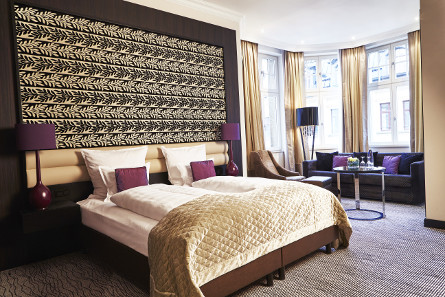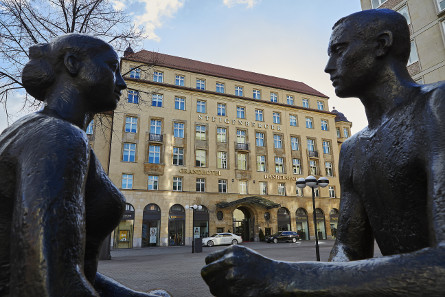Don Giovanni♪, W. A. Mozart, the 17.
Rigoletto♪, G. Verdi, the 19.



from Thursday 16 to Monday 20 May 2024,
4 nights
Arrangement 31, Pentecote
Arrangement 31, Pentecote
Don Giovanni
W. A. Mozart
W. A. Mozart
The myth of the seducer of women Don Juan (or in this case Don Giovanni) belongs to the world history of literature. This type of man is regarded as the personification of the instinctive libertine who disregards both the social order and divine laws and who ultimately despises the women whom he oppresses countlessly and arbitrarily.
W. A. Mozart’s (1756-1791) ingenious librettist Lorenzo da Ponte was also taken with this demonic figure of the eternal seducer, to whom the composer left the choice of the theme. After the triumphant success of “Le nozze di Figaro”, he was to write a new opera for the usual fee of one hundred ducats at the imperial request. Mozart’s entire creative power flowed into “Don Giovanni” and left the world of opera with music of supernatural beauty, alternating between cheerful opera buffa and great tragedy. They are striking for their rapid changes and sharp contrasts: sweet love arias alternate with dark passages that emanate a sense of death. In addition to the lascivious figure of the protagonist Don Giovanni and the comic figure of his servant Leporello, the two female characters Donna Anna and Donna Elvira symbolize great humanity, while the commander, who finally dissolves the drama, symbolizes the higher forces.
Through the unique fusion of these highly inhomogeneous elements, Mozart’s masterpiece is rightly considered one of the most perfect operas ever. Entertaining side note: Giacomo Casanova, Italian gallant and bon vivant par excellence, attended the premiere in Prague in 1787.
W. A. Mozart’s (1756-1791) ingenious librettist Lorenzo da Ponte was also taken with this demonic figure of the eternal seducer, to whom the composer left the choice of the theme. After the triumphant success of “Le nozze di Figaro”, he was to write a new opera for the usual fee of one hundred ducats at the imperial request. Mozart’s entire creative power flowed into “Don Giovanni” and left the world of opera with music of supernatural beauty, alternating between cheerful opera buffa and great tragedy. They are striking for their rapid changes and sharp contrasts: sweet love arias alternate with dark passages that emanate a sense of death. In addition to the lascivious figure of the protagonist Don Giovanni and the comic figure of his servant Leporello, the two female characters Donna Anna and Donna Elvira symbolize great humanity, while the commander, who finally dissolves the drama, symbolizes the higher forces.
Through the unique fusion of these highly inhomogeneous elements, Mozart’s masterpiece is rightly considered one of the most perfect operas ever. Entertaining side note: Giacomo Casanova, Italian gallant and bon vivant par excellence, attended the premiere in Prague in 1787.
Christoph Gedschold - Katharina Thoma
Sarah Traubel, Kathrin Göring, Samantha Gaul, Jonathan Michie, Sejong Chang, Matthias Stier
Opernhaus
Concert of the Gewandhausorchester, the 18.
Andris Nelsons♪
Andris Nelsons
Andris Nelsons was born in Riga in 1978. His mother founded one of the first music orchestras in Latvia and his father was conductor cellist. As a youth, Andris Nelsons studied piano and mastered the trumpet by the age of 12. He also sings as a bass baritone for his mother’s orchestra, and is particularly passionate about early music. Andris Nelsons is studying conducting with Alexander Titov in St. Petersburg. He caught the attention of Mariss Jansons when he was urgently called to the post of 1st trumpet of the Oslo Philharmonic Orchestra while on tour. Jansons becomes his mentor and Andris Nelsons has worked with him in conducting since 2002. In 2003 Andris Nelsons was appointed Principal Conductor of the Latvian National Orchestra and remained in office for four years. His passion for opera led him to conduct large orchestras such as the Birmingham Symphony Orchestra or the Leipzig Gewandhaus Orchestra as well as major events such as the Bayreuth Festival or the New Year’s concert in Vienna.
Violine:
Anne-Sophie Mutter♪
Anne-Sophie Mutter
The violinist Anne-Sophie Mutter is without doubt one of the most internationally renowned German classical music stars of our time. In her more than 40 years of concert activity, her program has regularly included not only the classical repertoire but also highly acclaimed world premieres and film scores. In addition to her own stage career, which has taken her to all the major renowned stages over the years, Mutter is also committed to promoting young musical talent through her own foundations.
The violinist has received numerous international awards for her outstanding musical and social commitment and her cultural achievements, including four Grammy Awards as well as the Mendelssohn Prize, the Great Order of Merit of the Federal Republic of Germany, the Bavarian Order of Merit, the Great Austrian Medal of Honor, and the French Order of the Legion of Honor.
Like all artists, Anne-Sophie Mutter has been affected by the pandemic-related break in performance. In order to draw attention to the disastrous situation in the music business, Mutter, together with some of her scholarship recipients, performed sporadically at church services and solicited donations for the emergency relief fund of the German Orchestra Foundation.
The violinist has received numerous international awards for her outstanding musical and social commitment and her cultural achievements, including four Grammy Awards as well as the Mendelssohn Prize, the Great Order of Merit of the Federal Republic of Germany, the Bavarian Order of Merit, the Great Austrian Medal of Honor, and the French Order of the Legion of Honor.
Like all artists, Anne-Sophie Mutter has been affected by the pandemic-related break in performance. In order to draw attention to the disastrous situation in the music business, Mutter, together with some of her scholarship recipients, performed sporadically at church services and solicited donations for the emergency relief fund of the German Orchestra Foundation.
Gewandhaus
Rigoletto
G. Verdi
G. Verdi
As already in his Luisa Miller, Verdi’s eponymous figure Rigoletto is not a man of rank, but a representative of the people, in this case a malformed court jester. The composer devoted himself with the greatest care to the psychological shaping of his hero. This may have been due to the fact that the Venetian censorship had initially banned the opera for insulting majesty, and that it could only be performed on stage after numerous changes. Since the libretto was changed several times and the scenic structure was also shaken, the unity of the play had to be preserved and restored in other ways. Thus Giuseppe Verdi (1813-1901) transposed it into the personal, tragic conflict of the Rigoletto, which is decisive for the plot and the connection between the characters. The composer succeeded excellently in combining recitatives, arias and duets into a higher musical unity and in dissolving the old structure of the number opera. He himself even regarded his work as revolutionary.
After the music had been criticized as too shallow and superficial by contemporaries, especially by followers of Richard Wagner, only Igor Stravinsky was able to overturn this verdict: He praised the ingenuity of the opera. Today, "Rigoletto" is part of the standard repertoire of every opera house, and the popular arias "La donna è mobile" or "Caro nome", which are extremely demanding to sing, are often performed in song recitals in isolation.
After the music had been criticized as too shallow and superficial by contemporaries, especially by followers of Richard Wagner, only Igor Stravinsky was able to overturn this verdict: He praised the ingenuity of the opera. Today, "Rigoletto" is part of the standard repertoire of every opera house, and the popular arias "La donna è mobile" or "Caro nome", which are extremely demanding to sing, are often performed in song recitals in isolation.
Anna Skryleva - Anthony Pilavachi
Sarah Traubel, Karin Lovelius
Opernhaus
Hotel informations for Leipzig 31


Steigenberger Grandhotel Handelshof *****
Located in the heart of Leipzig, a few steps away from the St. Thomas and St. Nicholas churches, close to the Opera and the Gewandhaus, the Steigenberger Handelshof ***** is ideally located for a cultural stay in the J. S. Bach city. Behind its historical facade, 177 large and comfortable rooms welcome you in a modern nd uncluttered atmosphere. A wellness centre, a Turkish bath, a sauna, the restaurant Le Grand and a bar, located inside the majestic atrium, complete its facilities.
Townhouse ****
The boutique hotel Townhouse Leipzig Vagabond Club offers its guests the ideal starting point for exploring the lively music city of Leipzig: located in the pedestrian zone opposite St Thomas’ Church, the Opera House and Gewandhaus are also within easy reach in just 10 minutes on foot. Parquet floors and modern design combine to create a charming temporary home, while the fitness, sauna and relaxation area takes care of your physical well-being. For breakfast, "The Breakfast Club Hawaiian Style" welcomes you with selected local (organic) products.
All-inclusive price per person for Leipzig 31
Single room/ night
Steigenberger Grandhotel Handelshof
1.620,- Euro
40-110,- Euro
Townhouse
1.250,- Euro
Auf Anfrage

The price includes
Overnights including breakfast, good opera tickets, travel cancellation expenses insurance.





